Allergic reactions are a set of symptoms that happen when your body tries to protect you from something it thinks is harmful. This can happen if you inhale, eat or touch something you’re allergic to. Symptoms can include mild to severe skin reactions, sneezing, vomiting or life-threatening airway swelling.
Advertisement
Cleveland Clinic is a non-profit academic medical center. Advertising on our site helps support our mission. We do not endorse non-Cleveland Clinic products or services. Policy

Image content: This image is available to view online.
View image online (https://my.clevelandclinic.org/-/scassets/images/org/health/articles/allergic-reaction-newest)
Allergic reactions are a set of symptoms that happen after you touch, inhale or eat something you’re allergic to. They can also happen after a bee sting. Examples of allergens that can set off allergic reactions include pollens, pets, dust, foods and medications.
Advertisement
Cleveland Clinic is a non-profit academic medical center. Advertising on our site helps support our mission. We do not endorse non-Cleveland Clinic products or services. Policy
Allergic reactions can be mild — maybe you get a small, itchy patch of skin where a dog licked you, or you get the sniffles after a few minutes outdoors on a spring day. But they can also be life-threatening, making it hard to breathe or dangerously dropping your blood pressure. Call 911 (or your local emergency service number) or get to an emergency room immediately if you have face, mouth or throat swelling, difficulty breathing or swallowing, or if you feel faint.
Specific types of allergic reactions include:
Symptoms of allergic reactions can include:
Advertisement
Anaphylaxis is a type of severe, rapid allergic reaction that’s a combination of these symptoms and low blood pressure. It can be life-threatening if not treated right away.
Allergic reactions happen when your immune system overreacts to something it mistakenly thinks is harmful. Common causes of allergic reactions include:
Sometimes, the cause of a reaction is obvious. Other times, you might need to see an allergist or dermatologist to diagnose the cause. They can perform allergy skin or blood tests to determine what you could react to.
If you’re having a severe allergic reaction — you’re having difficulty breathing, you’re feeling dizzy, or your face, lips, tongue or throat are swelling — call 911 or get to the nearest emergency room. Use your epinephrine auto-injector (EpiPen® or Auvi-Q®) if you have one that’s prescribed to you.
For milder allergic reactions, you might get some relief with:
In some cases, a healthcare provider might need to prescribe steroids to reduce inflammation.
If you have known allergens, avoiding exposure to them (eating, touching or inhaling them) is the best way to prevent an allergic reaction. Some strategies to reduce your risk of an allergic reaction include:
Avoiding allergens isn’t always possible, and sometimes you’re accidentally exposed to something you’re allergic to. Your provider might recommend you take certain medications daily or get specific treatments regularly. Depending on the type of allergy, treatments that could reduce your risk of an allergic reaction include:
Advertisement
Always carry an epinephrine injector with you if you’re at risk for a severe allergic reaction.
Go to the ER or call 911 if you experience symptoms of a severe allergic reaction, including:
Four types of allergic reactions (usually called hypersensitivity reactions) include:
When people talk about allergic reactions, they’re most often talking about either type I or type IV hypersensitivities.
Advertisement
Allergic reactions can range from minor annoyances to life-threatening emergencies. You should be especially cautious if you have allergic reactions to food, medications or bee stings. With the help of an allergist, many people are able to develop strategies to either avoid reactions or manage them when they happen. Carrying an epinephrine injector and having an emergency plan can help you feel prepared in case of an unexpected reaction.
Advertisement

Sign up for our Health Essentials emails for expert guidance on nutrition, fitness, sleep, skin care and more.
Learn more about the Health Library and our editorial process.
Cleveland Clinic’s health articles are based on evidence-backed information and review by medical professionals to ensure accuracy, reliability and up-to-date clinical standards.
Cleveland Clinic’s health articles are based on evidence-backed information and review by medical professionals to ensure accuracy, reliability and up-to-date clinical standards.
Allergies can wreak havoc on your life. At Cleveland Clinic, our team of experts can help create a treatment plan that’ll help you breathe easier.
